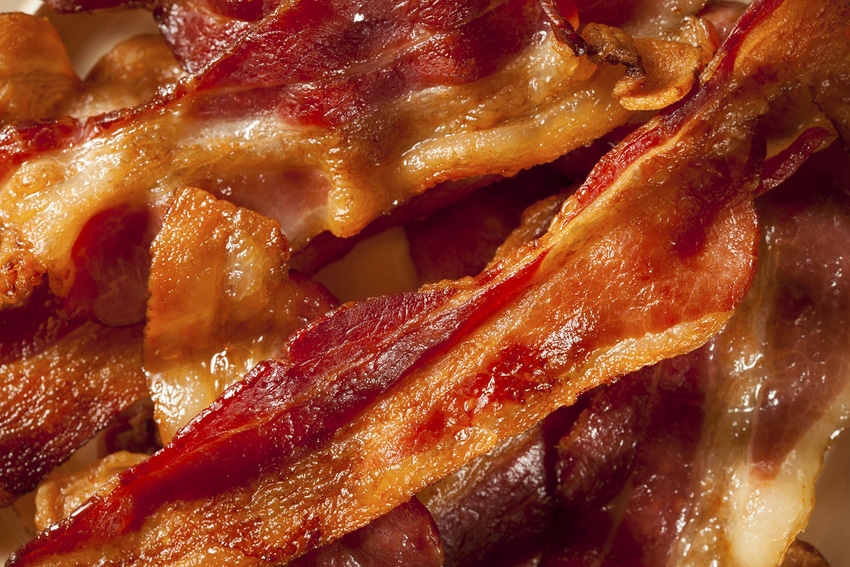Contrary to what mid-week headlines told you, we will not run out of bacon. You just may have to pay more for it.

A lot of big choices are being made this weekend: Another round of appetizers or should I go straight for the brisket? Should the bacon-wrapped mini weenies be on “warm” or “low” in the slow cooker? Do I go to the bathroom during the game, or during the commercials?
Oh yea, and, Falcons or Patriots?
One of the above-mentioned choices could have gotten a lot more serious if midweek headlines came to fruition. Mainstream media were doing their best “Piggy Little” as they blasted headlines such as “Now It’s Getting Serious: 2017 Could See a Bacon Shortage,” “The Looming Disaster of a U.S. Bacon Shortage” and “Nation’s bacon reserves hit a 50-year low as prices rise.”
I can’t even imagine the world without bacon. Bacon-wrapped mini weenies would just be tiny hot dogs basting in barbecue sauce, just lying there naked without their bacon-colored dreamcoat.
As cooler heads prevailed, as they always do (hopefully), fears were calmed that we are not running out of bacon. Len Steiner, Steiner Consulting Group, wrote in his Feb. 2 “Daily Livestock Report” that reports of bacon’s demise have been greatly exaggerated. Yes, USDA statistics show that pork belly stocks were down 4% from November and down 67% from the year prior. “What’s not in dispute is that we have never had such high pork belly prices this early in the year. Short covering and panic buying appear two key factors driving prices in our view,” Steiner writes. “USDA quoted the value of the pork belly primal yesterday at $171.09 per hundredweight, 38% higher than a year ago and 14% higher than the very high prices we experienced in 2013.”
These bumps in belly prices come at a time when hog production is about 1.3% above a year ago, and 11% higher than in 2013. “The improvement in the value of pork bellies has helped bolster the overall pork cutout and has significantly improved producer returns,” Steiner writes.
Though the expectations of higher spring and summer prices have improved due to higher cash hog and pork prices, Steiner cautions “we also think market participants realize the inherent risks in a market where one item is carrying so much of the value improvement, evidenced in the negative spread between February and April contracts. Can this excellent pork belly demand be sustained into the spring?”
With high priced bacon, or any cut of meat, retailers and foodservice marketers will need to up their game to keep the bacon flowing onto consumers’ plates. Steiner writes, “High prices in early 2013 did little to dampen demand that year and prices hit all-time record highs that summer. And for now, belly prices appear to be supported (in opinion) by robust retail and foodservice promotions that were likely booked during the fourth quarter when pork/belly supplies were quite ample.”
Americans have developed a taste and love for bacon, and the multitude of flavors and varieties that it offers. Just as marketers will get creative to lure consumers to continue to buy bacon, consumers will also get creative in their decision-making to keep bacon a mainstay in the kitchen. Instead of the over-priced coffee-house latte, buy bacon. Instead of buying a lottery ticket, go with the sure win — buy bacon. Instead of buying a bottle of water, drink out of the tap and buy bacon. This is bacon we’re talking about for God’s sake.
We approve this message …
As we have learned, a lot of time the actual game has taken a back seat to the ads and the food on Super Bowl Sunday. Companies go for the shocking or the funny to sell their product during the 30- and 60-second spots.
Before a pass is completed, a tackle is made, or even before the ball is kicked off the tee, HumaneWatch will make a big hit with its “Lawyers in Cages” spot. HumaneWatch.org is a project of the nonprofit Center for Consumer Freedom, and developed this commercial that parodies the Humane Society of the U.S. television ads that tug at viewers’ heart strings by showing images of dogs and cats that have been abused. Advertising works, as people get sucked into the HSUS message, because who doesn’t want to help abused animals and contribute to a local pet shelter. Well, apparently the HSUS, that’s who.
HumaneWatch’s pre-game commercial sets the record straight on the HSUS, saying that despite the name, the HSUS is not affiliated with local humane shelters, and gives only 1% of the HSUS $140 million budget to local humane societies.
“The public needs to know that they — and shelter pets — are being abused by HSUS,” says Will Coggin, managing director of the Center for Consumer Freedom in a press release. “People who are sick of the scam should send their donations to local shelters. That is where they can make a difference.”
Enjoy the ads, enjoy the game, and above all — enjoy the bacon.
About the Author(s)
You May Also Like



